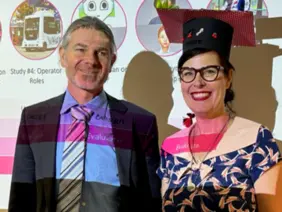How can women feel comfortable and protected in an autonomous shuttle? This perspective has rarely been considered in the research and development of such technologies.
Martina Schuß, 46, a user experience designer and engineer, has set herself the task of closing this gap. She remembers a workshop in which she discussed the needs for autonomous local transport with a group of women - especially the feeling of safety. ‘Who makes you feel safe here?’ she asked the participants. It quickly became clear that it is not the technology itself that triggers scepticism, but the feeling of a lack of safety.
After many years in the private sector, Schuß decided to do her doctorate at Ingolstadt University of Applied Sciences (THI) in the interdisciplinary Human-Computer Interaction Group under Professor Andreas Riener. She was given free rein in her choice of topic - freedom that Schuß knew how to utilise. She wanted to bring together automated driving and gender theory, a combination that had hardly been seen before. She pioneered this approach and closed a gap in research.
In her participatory research, she explored the question of what women need to feel comfortable and safe in an autonomous bus. Although the participating senior women had little prior technical knowledge, they engaged in a lively discussion about safety and trust in driverless buses. Together with UX students, they sketched out ideas for the interior of autonomous shuttle buses in creative sessions. From this, Schuß then formulated concrete proposals for the design of driving experiences based on the needs and concerns of women. Her goal: a human-centred, iterative design approach that builds a bridge between computer science and creative technology.
This interface work was not always easy for Martina Schuss. As an engineer in human-machine research with a special focus on gender issues and interculturality, she often had the feeling of moving between two worlds without quite fitting into one of them - but it was precisely this special profile that made her successful. At the renowned International ACM Conference on Automotive User Interfaces and Interactive Vehicular Applications, she received a Best Paper Award for her research. However, the topics that concern her go far beyond technical concepts. Martina Schuß grew up in the Czech Republic as the child of a single mother and knows from her own experience how important it is to make marginalised groups visible. She aims to give people with multiple disadvantages a voice in the field of autonomous driving.
Now, after completing her doctorate, she is taking some time out to think about her next steps. Her goal? A HAW professorship, because working with students inspires her: ‘I want to encourage young people to break new ground and combine topics that don't seem to go together at first glance,’ she says with a smile. ‘This is how we create a future worth living for everyone.’
Photos: THI/Graphics: Martina Schuß.


![[Translate to English:] Logo Akkreditierungsrat: Systemakkreditiert](/fileadmin/_processed_/2/8/csm_AR-Siegel_Systemakkreditierung_bc4ea3377d.webp)








![[Translate to English:] Logo IHK Ausbildungsbetrieb 2023](/fileadmin/_processed_/6/0/csm_IHK_Ausbildungsbetrieb_digital_2023_6850f47537.webp)


